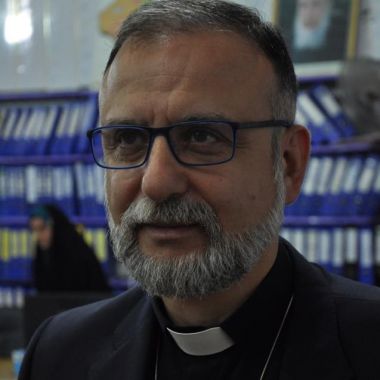Syrian priest: 'We can destroy ISIS without bombing'

A Syrian priest has urged the UK not to undertake air strikes in his home country, as MPs meet today to vote on whether Britain should join the coalition against ISIS.
"It is the wrong thing to do," Father Nadim Nassar, a London-based Anglican priest from Syria, told John Humphrys on Radio 4's Today Programme.
"I'm against it in terms of effectiveness and in terms of experience."
Nassar lived in Lebanon during the civil war in the 1980s, during which air strikes were undertaken in an attempt to end the conflict. "What did they do? Nothing. More casualties, more destruction, more bloodshed, and the war continued," he said.
"In Iraq for the last two years, [there have been] thousands of air strikes against ISIS. What happened? Mosul is still in the hands of ISIS. Nineveh is still in the hands of ISIS. Why should we, why should I as a Syrian, believe that the situation would be different in Syria?"
He admitted that the question of air strikes is a "moral maze", but said he didn't believe that there is such a thing as a moral war.
"God has given us the mind and the heart to use peaceful means to solve our conflict," the priest added.
Humphrys interjected, saying that if there was a simple political solution to the war in Syria, it would have been found by now, and it's not possible to dialogue with ISIS, who appear bent on waging war and destruction. Nassar, however, remained adamant that diplomatic measures had not yet been exhausted, and criticised western politicians for waiting too long to address the situation.
"If you use diplomatic measures, all the means you can, to defeat ISIS and you fail, let's talk again, but the western countries have not used that," he said. More needs to be done to stop money and weapons flowing into Iraq and Syria, he added.
"We can destroy ISIS without bombing. ISIS exports oil through Turkey, why haven't we addressed that? ISIS has a currency, that means money is pouring into ISIS, how is it pouring into ISIS?
"I was in Iraq a month ago, the situation is appalling. ISIS is not an army, they live with the people – where are they [the UK] going to bomb? There is no army, there is no front-line. They have to bomb cities and towns and villages, [which will mean] more casualties, more bloodshed. Is this morally correct?"
The UK government published a motion on Tuesday saying that ISIS poses a "direct threat" to Britain, and there is a legal basis for action. MPs are currently debating the issue in the House of Commons, and will vote at around 10pm this evening.
Prime Minister David Cameron today said the air strikes would help to "keep the British people safe" from terrorists.
"Do we work with our allies to degrade and destroy this threat and do we go after these terrorists in their heartlands from where they are plotting to kill British people, or do we sit back and wait for them to attack us?" he asked MPs.
"The question before the House today is how we keep the British people safe from the threat posed by ISIL. This is not about whether we want to fight terrorism, it's about how best we do that."
Cameron has been criticised for allegedly telling Tory backbenchers that those who oppose military action – a view taken by opposition leader Jeremy Corbyn – are "terrorist sympathisers".
However, today he said: "I respect people who come to a different view. I respect people who disagree."











